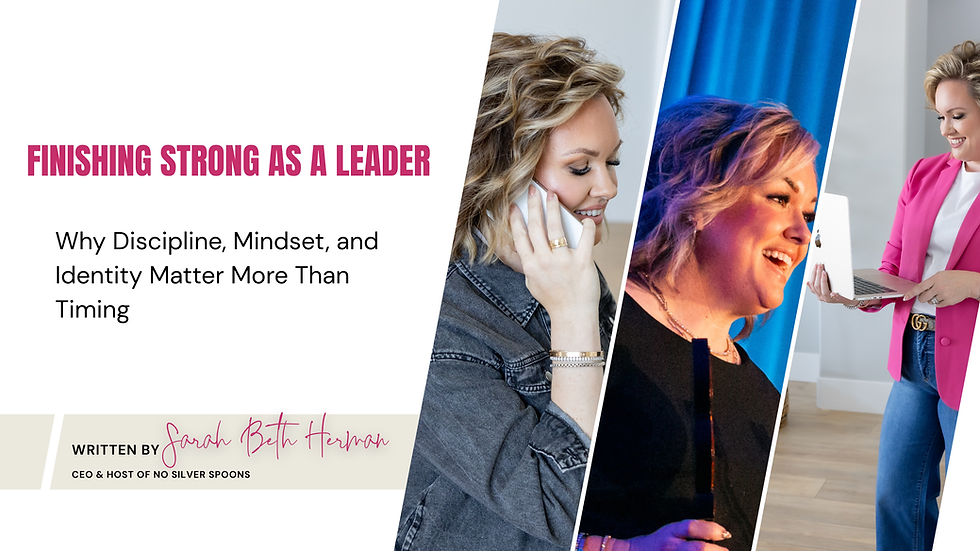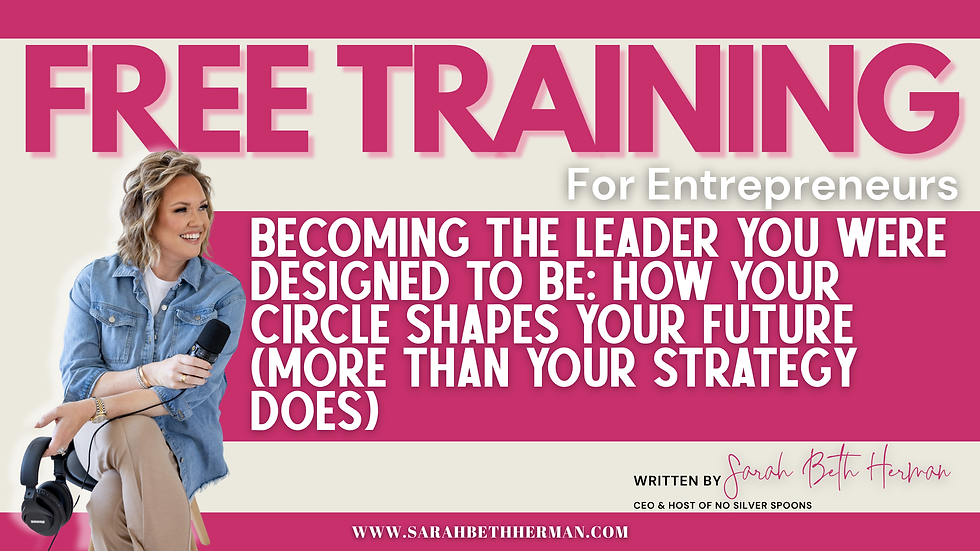When Success Feels Heavy — Leading After the Win
- Sarah Beth Herman

- Nov 20, 2025
- 6 min read
By: Sarah Beth Herman No Silver Spoons Podcast | Leadership Mentor | Faith-Driven CEO

Monday’s new No Silver Spoons® episode is about something few talk about honestly — the weight of winning. The quiet after the applause. The strange moment when you finally hit the milestone you’ve prayed for, but instead of relief, you feel responsibility.
Before that episode airs, I want to share what I’ve learned — not from theory, but from experience — about what it means to lead when success finally shows up and the world around you doesn’t know how to hold it.
Because no one warns you that success can feel lonely.
The Hidden Pressure Behind Every Win
If you’ve ever launched a business, landed your biggest client, or hit your first six-figure month, you know that success doesn’t come wrapped in peace.
It comes with new expectations, new expenses, and a subtle whisper in your head that says: Now you have to keep this up.
According to the Harvard Business Review (2024), nearly 67% of entrepreneurs experience higher stress levels in the first six months following a major business achievement. That’s because success doesn’t remove pressure — it simply reshapes it.
For small-business owners, that pressure might look like:
A flood of new clients that strains your systems.
A team that needs more leadership, not more tasks.
Friends or family who don’t understand your new priorities.
A calendar so full you forget to breathe.
It’s easy to confuse success with arrival. But the truth? Success is just a new level of stewardship.
The Aftermath of Achievement
The moment you hit your milestone — whatever your “$80,000 month” is — there’s pride, yes. But right behind it is a wave of quiet: Can I sustain this?

The truth is ambition doesn’t end at arrival — it evolves. The same fire that built your business becomes the one that sustains it. But here’s the catch: if you don’t manage that fire, it burns you out instead of fueling your growth.
After a big win, many leaders experience what psychologists call achievement fatigue — a mix of exhaustion and emptiness that sets in when the journey’s adrenaline wears off. You get the outcome you worked for, yet it doesn’t fill the space you thought it would.
Sound familiar? You’re not broken — you’re just meeting the next version of your leadership.
When the Applause Stops
Here’s something I’ve learned firsthand: not everyone claps when you win.
Sometimes, the people who once rooted for you grow quiet when you start growing beyond them. They won’t say it outright — but you’ll feel it in the way conversations change, how support fades, or how “must be nice” slips into their tone.
It hurts, especially when you’ve worked hard with honesty, sacrifice, and integrity.
But hear me — that silence isn’t a punishment. It’s a revelation.
Most people don’t resent your success. They resent what it reveals about their own unfulfilled potential.
That doesn’t make them bad — it just means you’re evolving in a way that others may not understand yet.
The Emotional Cost of Winning
According to Forbes (2024), 68% of top-performing founders experience isolation within three months of major success. Not because they dislike people, but because visibility invites opinion — and opinion often comes with projection.
You may notice things shift:
Conversations turn transactional.
Some friends don’t call anymore.
Others act as if your success was luck, not labor.
And in those moments, you may feel tempted to shrink — to hide what you’ve built so others stay comfortable.
Don’t.
You didn’t build your business to make people comfortable. You built it to make an impact.
Three Leadership Shifts for Sustaining Success
If you’re carrying the weight of growth right now, here are three simple shifts that helped me stay grounded after the wins:

1️⃣ Redefine What “Enough” Means
Ambition never ends. You hit one goal, and your mind immediately sets the next. That’s how high achievers are wired. But when you never pause to recognize what you’ve already accomplished, you rob yourself of gratitude.
Write down your three biggest wins from the past six months. Next to each, write how you felt after achieving it. Did you stop to celebrate — or did you move straight to the next goal?
Leaders who practice intentional celebration are 45% more likely to sustain high performance long-term (HBR, 2024). Gratitude keeps your drive from becoming a drain.
2️⃣ Guard Your Mental Real Estate
Success fills your schedule fast. Everyone wants your input, your advice, your time. But constant accessibility is the enemy of creativity.
Start scheduling “white-space time” — blocks on your calendar with no agenda, no notifications, no people. Use that time to think, pray, or just breathe.
A 2023 NIOSH study found that leaders who practice daily reflection experience a 20% reduction in anxiety and a 30% increase in strategic clarity.
Silence isn’t laziness — it’s leadership.
3️⃣ Steward, Don’t Shrink
Humility isn’t hiding your success. It’s stewarding it with gratitude and integrity.
It’s okay to say, “I worked for this.” It’s okay to share a win. What matters is how you hold it — open-handed, not tight-fisted.
In your next team meeting, say thank you. Out loud. Acknowledge who helped you get here. Gratitude reframes success as shared, not solitary.
Because success hoarded becomes heavy; success shared becomes holy.
The Science of Gratitude and Growth
Neuroscientists call it neuroplasticity — your brain’s ability to rewire itself through repeated thought.
The National Institute of Mental Health (2024) found that self-affirmations decrease cortisol and improve focus by 32%. When you declare, “I am capable. I am grateful. I am ready,” you’re not reciting clichés — you’re building new neural highways of confidence.
Pair that with gratitude, and your mental posture shifts from fear to fulfillment.
That’s why every morning I repeat:
“My name is Sarah Beth Herman. Only good things happen to me. I am successful. I am a builder. I can do this. I will succeed because I am already successful.”
It’s not arrogance — it’s alignment.
Protecting Your Peace After You Win
One of the greatest lessons I’ve learned is that peace isn’t a luxury — it’s a leadership strategy.
You don’t owe the world your exhaustion to prove your humility. You don’t have to post your struggle for validation.
You can rest without guilt. You can celebrate without apology. You can win without shrinking.
Because healed leadership doesn’t need to prove; it needs to protect — your peace, your purpose, and your praise.
Free Training Resource: The Success Check-In
To go with this week’s episode, I’ve created a free training download called The Success Check-In.
It’s designed for entrepreneurs, CEOs, and leaders who are learning to breathe again after the win.
Inside, you’ll find:
✅ A reflection worksheet to unpack what success really means to you.
✅ A five-minute gratitude journal to reset your focus.
✅ Simple affirmations to replace guilt with grounded confidence.
✅ A question guide to assess your peace vs. pressure levels each week.
You can download it free at SarahBethHerman.com/FreeTraining
Keep it on your phone or print it for your office — a quiet reminder that you can lead well and still live well.
Before You Go
Every canceled plan, every late night, every quiet moment when no one saw what you were building — they all brought you here.
So, when success feels heavy, remember:
You prayed for this season.
You were trusted with it.
And you’re strong enough to steward it.
You don’t have to shrink to fit someone else’s comfort. You don’t have to hide to stay humble.
Heavy blessings are still blessings.
And that’s your cue to keep going.
References
Harvard Business Review. (2024). Sustaining High Performance Through Celebration and Reflection. https://hbr.org
National Institute for Occupational Safety and Health (NIOSH). (2023). Workplace Stress and Leadership in Entrepreneurial Settings.
National Institute of Mental Health. (2024). The Science of Self-Affirmation and Cortisol Reduction.
Forbes. (2024, March 5). Leadership Fatigue: Why Success Can Feel Lonely.
University of California, Berkeley – Greater Good Science Center. (2024). Gratitude and Neuroplasticity in Business Leaders.

Disclaimer: The information provided in this blog is for informational purposes only and does not constitute professional advice. Readers should consult with appropriate professionals for specific advice tailored to their circumstances. All efforts have been made to ensure the accuracy of information and references; however, errors may occur. If you notice any inaccuracies or would like to suggest updates, please contact us at hey@sarahbethherman.com. © 2025 Sarah Beth Herman. All Rights Reserved. By using this site, you agree to our Privacy Policy and Terms of Use. This post may contain affiliate links, and we may earn a commission at no extra cost to you if you make a purchase through them. References included where known. Please email hey@sarahbethherman.com



Comments